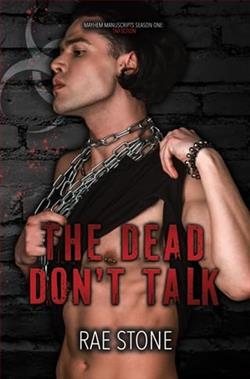Page 126 of Where the Heart Leads
Alert nodded. “Then once I’ve passed the items onto buyers, and they’ve paid me, you’ll get the rest of your share. As agreed.”
“Good.” Smythe stuffed the folded papers into the pocket of his heavy coat.
“One thing.” Alert’s voice grew cold. “As we also agreed, you are to ensure no other items are lifted from those particular houses by your boys. Once we’ve sold our items and have our cash, you can go back if you wish, but—and I can’t stress this enough—only the item I’ve listed must be lifted from each house at this time.”
Smythe nodded. “I agreed to that at the outset—I haven’t forgotten. We’ll run the job as you wish. But what about the police? You said you’d check.”
“Indeed. And I have. There will be no extra police on the beat tomorrow night.”
“And what about the second night—assuming you’re still set on doing your other four houses on the following night?”
“Yes—that can’t change. The explanation is complicated, but we can’t risk anything more than two nights.”
Smythe studied Alert for a moment, then nodded. “All right—but what about the police on the second night?”
Again Alert’s voice grew arrogantly cold. “Now you see why I wanted all eight houses done on a single night. There is, of course, a chance—a possibility, no more—that the police will be alerted and move to increase patrols in Mayfair. However, they’re unlikely to move fast enough to trouble us seriously on the second night. A third night would be foolhardly, but the second night will be only marginally more dangerous than the first.
“In addition, I’ve learned who’s driving the police interest in our scheme. I’ve taken steps to ensure they won’t be free to meddle in our activities on the second night. Through the first night, they’ll remain blissfully ignorant—even now that we’ve had to reorganize to two nights, if luck is with us they won’t even know we’ve struck until months from now.”
Smythe studied him through the gloom. “So we won’t be bothered—not by anyone?”
“Even if they’re alerted, the most likely scenario is one we’ll be able to work around.” Alert straightened; confidence infused his voice. “I’ll have the details of any extra forces out and about on the second night. And as for our interferring busybodies”—he smiled, a flash of white teeth in the darkness—“I’ve organized a distraction for them.”
21
As I feared”—Stokes slumped into what had become his usual armchair in Griselda’s parlor—“my request to put more constables on the beat in Mayfair fell on deaf ears.”
The others—Penelope and Barnaby on the sofa, Griselda in her chair—grimaced. They’d made no plans to meet that afternoon, but once her duties at the Foundling House had been completed, impatient and at loose ends, Penelope had come to call in the faint hope Griselda might have heard something from her East End friends—a hope Griselda, shutting her shop early, had dashed.
Barnaby had arrived shortly afterward; Stokes had been ten minutes behind him.
After a moment, Stokes went on, frustration ringing in his tone, “If I had some real threat—some proof of it—I’d get action without delay. However, the very fact that to us makes the burglaries much more likely, namely the absence of tonnish households from town and the resulting empty mansions, works against us in calling for more police on the streets—all the superintendents see is that with hardly any nobs in town, there’s little chance of some tonnish head being cracked during a burglary, ergo, no need for any but the lightest police presence.”
Accepting the mug of tea Griselda handed him, Stokes sipped, then rather glumly looked at Penelope. “When we were discussing Alert’s plan, you mentioned that those not of the ton might not appreciate how many things of great value were left lying around in Mayfair mansions.” He grimaced. “You were right. My superintendent simply can’t imagine it. And none of the governors I know—like Barnaby’s father—are still in town.”
Stokes sighed. “I tried. I outlined what we believe Alert’s plan to be, but the higher-ups think I’m being fanciful.”
“Much as it suits us not at all, your superintendents are right—at least from their point of view.” Barnaby slumped back in his corner of the sofa. “We have no proof—everything we’re saying is conjecture and speculation.”
Griselda shook her head. “Missing boys and murder aren’t speculation.”
“Exactly.” Penelope’s voice was a great deal more decisive, not to say belligerent. “I don’t care about snuffboxes, or vases, or whatever Alert plans to steal, but we have to rescue those boys. If the police won’t patrol the streets of Mayfair, we’ll have to.”
As one Stokes and Barnaby sat up. “No.”
They’d spoken as one, too. Penelope looked from one to the other, a frown darkening her face. “But—”
“No.” Barnaby trapped her gaze. “We cannot go wandering the streets at night in the hope of running into Smythe and Alert.”And instead running into God knew who else.Pushing the image of Penelope stalking down dark deserted streets, cobbled mews, and dank lanes behind houses from his mind, he spoke quickly. “We’ll have to think of some other way to approach this—for instance, looking at how Alert plans to sell the stolen items.” He glanced at Stokes. “If these items are extremely valuable, they’ll most likely be rare and highly identifiable. The usual sellers of nicked goods know better than to touch such things.”
“True.” Stokes frowned. “So how…?”
“He must have something organized. I wonder…” It took a moment for the notion to clarify in Barnaby’s mind. “Could Alert be stealing on demand, as it were? Could he be stealing specific items that people he knew of wanted, and were ready to pay for if he delivered them?”
He looked at Stokes, who shrugged.
“Could be. But as we don’t know the items, that doesn’t get us much further.”
But it had distracted Penelope from her notion of marching around Mayfair’s streets; with any luck, she was now thinking of who might be Alert’s “buyers.” Barnaby was congratulating himself on having diverted her train of thought when Griselda spoke—demonstrating that she, at least, hadn’t been diverted at all.















